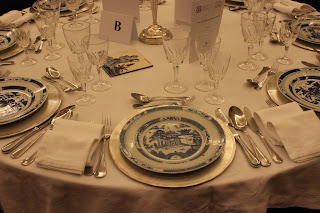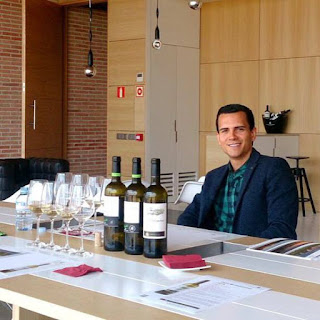“Sweden – Portugal and the Restoration of the Portuguese Independence (1640)"
A joint dinner with the “Associação dos Amigos da Fundação dasCasas de Fronteira e Alorna”
The Palace, classified as a national monument, is still inhabited by descendants of its founders and is – together with its gardens - widely acclaimed.
 |
Her Excellency the Ambassador of Sweden honored us with her presence and so the 12th Marquis de Fronteira e Alorna, Dom José Mascarenhas
Fotos by Cristhian Pulgar
SOME GUESTS |
 |
| Vanda Anastácio guided the participants through the topic of the evening and also touch on particularly noteworthy aspects of the Palace and the Marquises de Fronteira e Alorna. In addition to being a Professor at the University of Lisbon she is also responsible for the cultural affairs of the Fundação Fronteira e Alorna. The “Associação dos Amigos da Fundação das Casas de Fronteira e Alorna” has as its main objective to raise funds to support the maintenance and continued restoration of the Palace |
The Dinner
 |
| chef Jimmy Leon |
 |
| Chef Jimmy Leon |
Farewell Dinner to Hon Dr .Pessoa a Costa from AICEP
As Dr Pessoa is being sent to Panama as honorable ambassador represented Portugal. We decided to invite him to a Panamanian dinner.
fotos by Cristhian Pulgar
Interview with Award winning and internationally experienced wine business professional of Sweden, Cruz Liljegren.

The first references about wine lead us to the ancient Greece where they mixed it with water and kept in goatskins. Charles the Great was accredited with the creation of large vineyard plantations, but all of low quality. In Spain, it was the Romans who planted the first vineyards. • PIERRE PÉRIGNON introduced the first wine in a bottle with a cork.
After a recent meeting with Swedish and Portuguese sommeliers here in Lisbon, today we decided to leave the past and history and come back to the present and make an interview with one of the most remunerated young sommeliers in Sweden. A sommelier is not only a connoisseur of wine, a sommelier is the manager of wine callers, is the creator of a style that project through the wine.
Today we interview Award-winning and internationally experienced wine business professional of Sweden, Cruz Liljegren.
Why Wine? And how did you develop this interest?
I come from a food background really, my first passion was Swedish traditional dishes so I applied for a job at the Stockholm restaurant Stallmästaregården the day after my graduation as a chef, it’s one of the most classic restaurants in Sweden, or at least it was. Then in 2007, I was appointed Head Chef for a section of the Royal Swedish Navy, this was my military service. It was really because of the officers that I had to learn about wine, as they needed recommendations for the dishes I prepared. Little by little my wine interest took over.
When did you start your career in the wine world?
It was in 2007 on Systembolaget in Saltsjöbaden, Stockholm (the Swedish alcohol monopoly). I was a salesperson and responsible for the store communication towards our clients.
Who were your mentors?
Unfortunately, I don't have any mentors and can´t remember that I've ever had, still looking.
What courses have you taken? Certifications? Awards won?
Master in Wine Business, Burgundy School of Business
Bachelor’s degree in Culinary Arts and Meal Science, Örebro University
Included in”A Circle of Wine Writers, London” as the youngest member ever
Robert Mondavi Diploma winner
Rioja Sommelier Award
Scholarship from Wines of Portugal
Advanced Certificate from WSET
What is your philosophy on wine and food?
I’m frankly not very interested in the art of food and wine in combination. I don't give it much thought really, just drink what I like and eat what I like. I would never order a wine I don't absolutely enjoy on its own, even if it's a great combination”. What I do find important most of the time is to think locally, again, drinking wine from the region of the dish feels great.
What wine regions are you interested in at the moment?
I´ve always been very interested in Moscatel de Setúbal. There is something with the brightness of aromatics together with the influence of wood and time that is completely unique. I’m also a big fan of sweet wines together with a dish that has a sweet element to it. A Moscatel d Setúbal with the Cantonese classic sweet and sour pork is amazingly delicious.
What is your favorite wine?
Sherry and Chambolle-Musigny
What are your ultimate career goals?
My goal is really to have my own wine brand or winery, something very special, unlike anything produced today. Still looking for the perfect region.
What do you think about Portuguese wines in general?
Despite a very long history of wine production, Portugal is still looking for its particular style and place in the wine world. Many of the best wines today are the same as hundreds of years ago. To get a clear expression in a wine you need time, deep thinking and some hard choices as far as production methods. A trend that I like is the use of clay pots for fermentation in Alentejo, the region just need some really quality-focused producers to get more attention internationally. Also, Portuguese food and food culture need to get exported to a greater extent.
How would you describe wine drinking in Sweden?
Since the late 1970s wine has become an increasingly popular drink. There is a famous saying that goes ”you always want what you can´t get” — that’s very true, Swedes are generally more interested in wine than people in wine producing countries such as France, Spain or Portugal. Winemakers that visit Sweden are usually impressed by the high wine knowledge of the general public. The Portuguese wine Periquita has been selling well in Sweden since 1979.
What would you recommend to the owners of restaurants about wine buying and wine serving?
Well, to keep it as local as possible. If you have a restaurant in Lisbon it makes sense that at least 50 percent of your wine list is regional. Be proud of your region basically, it’s too boring as a guest when all wine lists look the same.
We thank you for this interview Cruz and we wish you all the best in your future career.
Jimmy Leon
Read more about Cruz under :
ROYAL VISIT IN LISBON
 |
| http://livrustkammaren.se/sv |
Swedish Royal Armoury foundation headed by HKH Prinsessan Christina.
The Royal Armoury, adults as well as children can take part of the historical reconnaissance and take note of the crucial moments in Swedish history. War and peace are reflected in the elaborately decorated weapons and armor. Precious costumes and sumptuous carriages tell us about coronations and weddings, baptisms and funerals of kings, queens, princes, and princesses. The Royal Armoury is located in the Royal Palace in Stockholm.
Lisbon and the
Museu Nacional dos Coches
have the honor of the visit of the Swedish Royal Armoury foundation headed by HKH Prinsessan Christina.
photos by Cristhian Pulgar
+++
It is the mission of the National Coach Museum to ensure the information, research and conservation of their collections, in the firm belief of their role as culture generator.
A welcome dinner to begin the start of the tour was given by the Swedish Ambassador to the members of the foundation.

It is the mission of the National Coach Museum to ensure the information, research and conservation of their collections, in the firm belief of their role as culture generator.
The now opened building opens up a new path in the history of the National Coach Museum since it was endowed in your program all the necessary valences the performance of its mission.

 |
| Chef Jimmy Leon with Prinsessan Christina Foto by Cristhian Pulgar |

++++++
Portugal
Swedish sommeliers meet Portuguese sommeliers
A dinner on the occasion of the visit to Portugal of the Wine journalists and Swedish Sommeliers was given by the Swedish Ambassador Caroline Fleetwood at her residence. The dinner gathered people from Viniportugal and AICEP
Portugal is today the 12th largest producer in the world but the 9th largest exporter in the world, with 2.8% market share, even when taking into consideration that they have one of the hightest consumption of wine per capital. Portuguese wines exports are been reaching maximums every year for the last 5 years. In 2014 reached 729M euros. Being one of the few wine countries in the world that keeps growing. Exports to Sweden have grown 11% in the 5 years period. The future for Portuguese wines is very promising and they are growing globally almost 5%.
A dinner on the occasion of the visit to Portugal of the Wine journalists and Swedish Sommeliers was given by the Swedish Ambassador Caroline Fleetwood at her residence. The dinner gathered people from Viniportugal and AICEP
Portugal is today the 12th largest producer in the world but the 9th largest exporter in the world, with 2.8% market share, even when taking into consideration that they have one of the hightest consumption of wine per capital. Portuguese wines exports are been reaching maximums every year for the last 5 years. In 2014 reached 729M euros. Being one of the few wine countries in the world that keeps growing. Exports to Sweden have grown 11% in the 5 years period. The future for Portuguese wines is very promising and they are growing globally almost 5%.
Portuguese wine is the result of traditions introduced to the region by ancient civilizations, such as the Phoenicians, Carthaginians, Greeks, and mostly the Romans. Portugal started to export its wines to Rome during the Roman Empire. Modern exports developed with trade to England after the Methuen Treaty in 1703. From this commerce a wide variety of wines started to be grown in Portugal. And, in 1758, one of the first wine-producing region of the world, the Região Demarcada do Douro was created under the orientation of Marquis of Pombal, in the Douro Valley. Portugal has two wine producing regions protected by UNESCO as World Heritage: the Douro Valley Wine Region (Douro Vinhateiro) and Pico Island Wine Region (Ilha do Pico Vinhateira). Portugal has a big variety of local kinds, producing a very wide variety of different wines with distinctive personality.
 |
| foto by Cristhian Pulgar |
+++++++++++++++++
A special menu was composed to match the wonderful wines that Viniportugal offers to the professional wine tasters.
 |
| photos by Cristhian Pulgar |
Our swedish guests
Some of the wines
ViniPortugal is the Interprofessional Association of the Portuguese Wine Industry and the entity managing the brand Wines of Portugal. Its aim is to promote the image of Portugal as a wine producing country par excellence by valuing the brand Wines of Portugal.
Founded in 1997 as a private non-profit association, it groups leading associations and professional organizations representing the trade (ANCEVE and ACIBEV), production (FENAVI and FEVIPOR), cooperative wineries (FENADEGAS), distillers (AND), farmers (CAP) and demarcated regions (ANDOVI).
Through ViniPortugal, the brand Wines of Portugal is consistently present in 4 continents and 11 strategic markets. With an annual investment of around 7 million euros, ViniPortugal carries out over 100 annual Portuguese wine promotional actions involving around 350 national wine producers. Read more under. http://www.viniportugal.pt/en/HomePage

New Swedish Honorary Consulate in the Azores
On July 24, was the inauguration of the new Swedish Honorary Consulate in Ponta Delgada on the São Miguel island in the Azores. New Honorary Consul will be Nuno Bettencourt Raposo.
Relations between Sweden and the Azores are very strong and already in 2000 established a tourist travel office in the Azores, which opened the way for major investment and employment in the tourism sector. This year about 7,000 Swedes visited the Azores. Following the Swedish food culture, we organized a Swedish smörgåsbord to celebrate the inauguration of the new honorary consulate and its new consul. Read more under http://www.swedenabroad.com/sv-SE/Ambassader/Lissabon/Aktuellt/Nyheter/Nytt-svenskt-honorarkonsulat-pa-Azorerna-sys/
The Azores are very beautiful islands, composed of nine volcanic islands situated in the North Atlantic Ocean about 1,360 km (850 mi) west of continental Portugal. The inauguration of the new Swedish Honorary Consulate in Ponta Delgada was celebrated at the Royal Garden Hotel. Located on the larges island of the Azores, The hotel offers complete comfort and it makes the best start point to discover the magic of these blessed islands.
The cooperation with the staff of the hotel went more than well and especially in the kitchen, the staff made me feel very welcome. The kitchen, runs by Head chef Michael Ross could not offer the guests but only the best.
 |
| Head Chef Michael Ross |
 |
| Thank you very much for cooperation and support during my visit to your kitchen. I wish you all of you the best. Jimmy Leon |














































